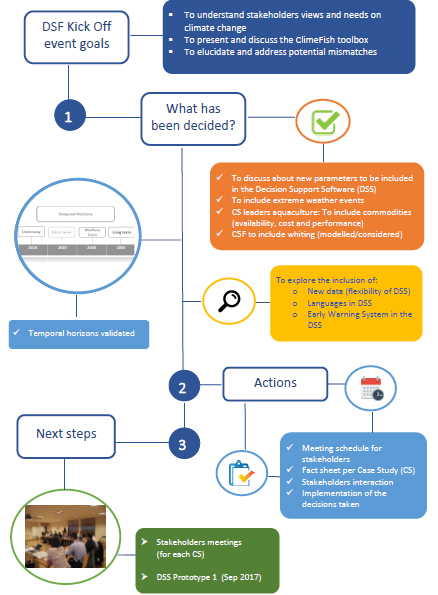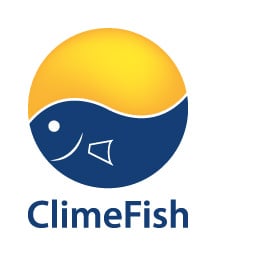First stakeholder meeting

Stakeholders from fisheries, aquaculture and lake and ponds production met with ClimeFish researchers to present their needs and discuss their views for the Decision Support Framework (DSF).
The ClimeFish DSF is a web-based toolbox that will support seafood production in Europe under climate change conditions. This framework will include several resources for decision-making as management guidelines, models, datasets, sample runs, maps and the Decision Support Software (DSS).
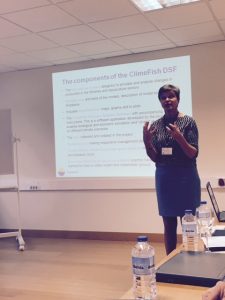 “The software tool will simulate the effects of climate changes on fisheries and aquaculture production, as well as socio-economic indicators in marine and freshwater systems across Europe”, Project Leader Michaela Aschan explained.
“The software tool will simulate the effects of climate changes on fisheries and aquaculture production, as well as socio-economic indicators in marine and freshwater systems across Europe”, Project Leader Michaela Aschan explained.
An ambitious and useful project
Throughout all the project, interaction between stakeholders and researchers will be constantly implemented to foster a co-creation process for the DSF. Key decisions for the design of this ClimeFish toolbox were taken during the meeting between stakeholders and researches.
In this first event in Vigo, Spain, stakeholders expressed their major concerns about climate change and gave their impressions about the project’s challenges and what they expect from it. Resource abundance and distribution were some of the biggest worries that the majority of stakeholders shared regarding climate change. They also pointed reduced income as one of the major negative impacts of climate change. This information is very valuable for the project’s researchers as they will try to develop the Decision Support Framework (DSF) according to these stakeholders’ views and requests.
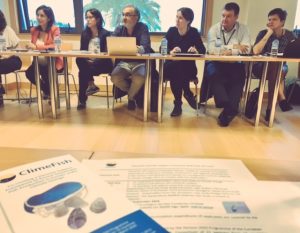 Representative stakeholders from the three implementation case studies (C5F from the fisheries sector; C10A from the lake and ponds sector and; C12A from aquaculture sector) and two simulation cases (C1F and C13A) showed they were truly interested in the project.
Representative stakeholders from the three implementation case studies (C5F from the fisheries sector; C10A from the lake and ponds sector and; C12A from aquaculture sector) and two simulation cases (C1F and C13A) showed they were truly interested in the project.
During the meeting several stakeholders outlined the ambitious and usefulness of the project. In fact, attendants reached a consensus decision regarding the validation of the temporal horizons, proposed for being included in the DSF and the inclusion of new parameters for the Decision Support Software (DSS), such as extreme weather events (e.g. droughts and cyclones).
Stakeholders’ hub for co-creation
“Using the co-creation approach, that combines analytical and participatory processes, can help multiple stakeholders work in synchrony to find and implement effective climate change strategies. We consider this participatory approach as the best way to find out the stakeholder’s interest and needs from the very beginning of the project”, Rosa Chapela outlined, leader of Stakeholder Interaction and responsible of arranging the meetings.
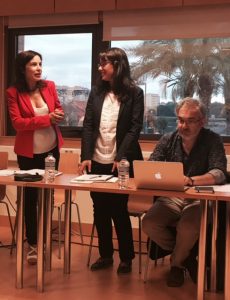 More than 50 stakeholders from the 16 case studies have been selected to collaborate in co-creating ClimeFish. The project boosts the participation of stakeholders through a co-creation strategy in which stakeholders and researchers interact continuously along the project life.
More than 50 stakeholders from the 16 case studies have been selected to collaborate in co-creating ClimeFish. The project boosts the participation of stakeholders through a co-creation strategy in which stakeholders and researchers interact continuously along the project life.
For this purpose, a stakeholder hub has been implemented. It combines physical events such as workshops, case study meetings or seminars, and digital communication through the website, social media or newsletters, to facilitate effective communication. A total of 14 workshops are going to be held for each simulation and implementation case study throughout the project.
“All the stakeholders are invited to assist to the case study meetings”, highlighted Rosa Chapela.
They have been divided into two rounds; the first round of meetings will take place before May 2018 and the second until March 2019. Currently, the events calendar is being agreed with case study leaders and stakeholders and it will be published on the project’s website.
Next steps
The DSF kick-off meeting has been the starting point for gathering stakeholders from implementation case studies and researchers from ClimeFish. The interaction process will follow up with the forthcoming workshops being focused on simulation and implementation case studies. To ease Stakeholder participation, these workshops will take place in their countries: Italy, Norway, Spain and Iceland (simulation case studies), and Scotland, Hungary and Greece (implementation case studies), in order to facilitate the co-creation approach. So, keep attentive to the website updates and do not lose sight of the upcoming events’ calendar.
Summary of the DSF kick-off event:
